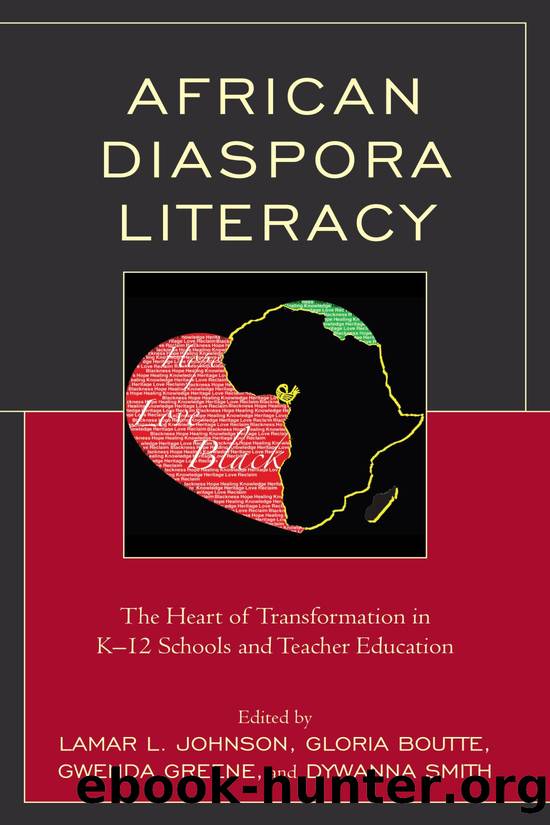African Diaspora Literacy by unknow

Author:unknow
Language: eng
Format: epub
Publisher: Lexington Books/Fortress Academic
Chapter 6
A Call for âWork Wokeâ Educators
Actuating Diaspora Literacy to Raise Critical Consciousness
Gwenda Greene
KEY TERMS AND DEFINITIONS
â¢Critical Consciousnessâthe awakening of real components of oppressive situations; learning to perceive social, political, and economic contradictions, and to take action against the oppressive elements of reality (Freire, 1968/2000).
â¢Emancipatory Pedagogyâteaching in a manner that is informed by African worldviews, cosmologies, philosophies, and cultural concepts and practices of African diasporan people. This pedagogical approach is intended to be used as a way to liberate and heal African students whom have been viewed and taught from Eurocratic perspectives (King & Swartz, 2016).
â¢Parallel Thinkingâa critical and creative thinking strategy for which a group of people work together to address a problem, issue, or challenge (DiYanni, 2015).
â¢Wokeâbeing aware, and âknowing whatâs going on in the community.â It also mentions its specific ties to racism and social injustice (Foley, 2016).
â¢Work Wokeâmoving from the awareness of injustices to using your talents to apply actions for solving issues of injustice (beBATONROUGE, 2018).
UNFOLDING MY CRITICAL CONSCIOUSNESS
Starting in 2016, I traveled three consecutive years to West Africa: twice to Cameroon and then Ghana. For my 2016 travel to Cameroon, I went with a group of higher education professionals whose purpose was to share educational research and teaching strategies at an international conference. I demonstrated tools used to teach the concept of parallel thinking to students as a component in a critical and creative thinking course at the historically Black institution where I work. As a demonstration of learning, students were responsible for applying the concept using the text of Martin Luther Kingâs (2015) Letter from Birmingham Jail. I shared with the Cameroonian scholars some of the realities that transpired in the process of teaching the concept that I introduced:
1.The millennial studentsâ lack of historical knowledgeâI cringed about millennial studentsâ knowledge of history and complained of their inability to fully engage scholarly discussions of inalienable rights, voting, and liberty in the 1960s. For example, upon a review of Letter from Birmingham Jail, I was taken aback by studentsâ response to a query of Kingâs purpose in writing the letter which they said was to help âfreeâ the black people in Alabama from slavery.
2.Making the learning relevantâThe decision to use the movie Selma (Webb & DuVernay, 2014) as a teaching tool to provide the visual vistas students needed of the original historical, cultural, and ideological contexts presented in Kingâs letter. Directed by Ava DuVernay, Selma was a blockbuster movie in 2014 of the quest for civil rights by Dr. Martin Luther King Jr. and protestors who pressed forward toward the epic march from Selma to Montgomery, and their efforts culminating in President Lyndon Johnson signing the Voting Rights Act of 1965.
Shortly after returning from Cameroon, I received the news from the US Department of Education of the second opportunity to travel to Cameroon in 2017, this time as a Fulbright-Hays Groups Study Abroad participant. I spent nearly seven months preparing through planning and rigorous study of diaspora literacy. Shared in a study session, âDiaspora literacy is Black peopleâs knowledge of their (collective) story and cultural dispossession.
Download
This site does not store any files on its server. We only index and link to content provided by other sites. Please contact the content providers to delete copyright contents if any and email us, we'll remove relevant links or contents immediately.
Getting It, Then Getting Along by L. Reynolds Andiric(653)
Religion and Politics Beyond the Culture Wars : New Directions in a Divided America by Darren Dochuk(575)
Global Justice, Christology and Christian Ethics by Lisa Sowle Cahill(428)
Positive Psychology in Christian Perspective: Foundations, Concepts, and Applications by Charles Hackney(354)
Forgiveness and Christian Ethics by Unknown(347)
Douglas Hamp The First Six Days by Unknown(296)
The Horrors and Absurdities of Religion by Arthur Schopenhauer(271)
Insurgency, Counter-insurgency and Policing in Centre-West Mexico, 1926-1929 by Mark Lawrence(266)
Middle Eastern Minorities: The Impact of the Arab Spring by Ibrahim Zabad(250)
Christian Martyrdom and Christian Violence by Matthew D. Lundberg;(242)
The Oxford Handbook of Greek and Roman Mythography by R. Scott Smith;Stephen M. Trzaskoma;(235)
Beyond Heaven and Earth by Gabriel Levy(232)
God and Eros by Patterson Colin;Sweeney Conor;(230)
The Bloomsbury Reader in Christian-Muslim Relations, 600-1500 by David Thomas;(223)
Autobiography, Volume 2: 1937-1960, Exile's Odyssey by Mircea Eliade(215)
Witches: the history of a persecution by Nigel Cawthorne(211)
Cult Trip by Anke Richter(210)
An Introduction to Kierkegaard by Peter Vardy(198)
The Global Repositioning of Japanese Religions by Ugo Dessi(195)
